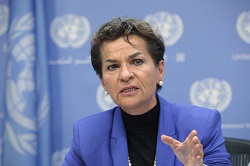Sometimes personalities matter. What if the ‘hanging chads’ in the Florida vote had been counted differently and Al Gore had become President in 2000 instead of George Bush. It was a sliding doors moment for climate change.
Elizabeth Kolbert takes a look at the state of play in international climate negotiations, and the woman who directs the UN effort to strike a climate agreement in Paris.

My brother Len drew my attention to this excellent article. It was too late for the latest edition of Climate clippings, so rather than leave it until I get back in October, I decided to put it up as a longer post now.
Kolbert covers the whole labyrinthine development of international climate negotiations under the UNFCCC (the UN Framework Convention on Climate Change), the current state of play, and gives us a lively portrait of Figueres and what special characteristics she brings to the task.
Figures is emotive to the point of being called “a mini-volcano” by one of her aides, but very rational and clear-eyed. She can mix it with the elites, but as an anthropologist she learned to sit down with tribal peoples.
Her approach to diplomacy seems to come out of her anthropological training. She listens, decentres and tries to imagine how others see the world. Careful to use language that doesn’t offend, she builds on the positive.
She sketched for Kolbert her vision of the future:

It’s not a matter of alternative futures, the two lines mean different things. The straight line is economic growth, the curved line is emissions. The task is to decouple the two.
- “That’s where we are,” she said, drawing a dot right at the point where the two lines were about to diverge. She gestured toward an office tower across the street: “I think you and I will be alive when that building, all of those windows, will be covered with very, very thin-film solar cells, so that the building can produce all the energy it needs and maybe more.”
Figueres knows this is the stark reality:
- To hold warming to less than two degrees Celsius, global emissions would have to peak more or less immediately, then drop nearly to zero by the second half of the century. Alternatively, they could be allowed to grow for a decade or so longer, at which point they’d have to drop even more precipitately, along the sort of trajectory a person would follow falling off a cliff. In either case, it’s likely that what are known as “negative emissions” would be needed. This means sucking CO2 out of the air and storing it underground—something no one, at this point, knows how to do.
She chooses to emphasise the positive, not just to build on what is there, but to imagine the possible. She sees Paris in December as a critical step in the story of the human race:
- “You know, I think that this whole climate thing is a very interesting learning ground for humanity. I’m an anthropologist, so I look at the history of mankind. And where we are now is that we see that nations are interlinked, inextricably, and that what one does has an impact on the others. And I think this agreement in Paris is going to be the first time that nations come together in that realization. It’s not going to be the last, because as we proceed into the twenty-first century there are going to be more and more challenges that need that planetary awareness. But this is the first, and it’s actually very exciting. So I look at all of this and I go, This is so cool—to be alive right now!”
As Len said on Facebook:
- Cometh the time, cometh the person! What an amazing challenge she, and we all, are facing!


Yes, pity Australia’s current bunch of buffoons in Government aren’t up to the task of behaving responsibly
Not to put a dampener on it but she’s also a hereditary multi millionaire that has never spent a day of her privileged life without using fossil fuels.
Her President Daddy cut down more trees than Gunns.
Another round of UN talks has just wrapped up in Bonn.
It is readily apparent that the mood is far better going into the Paris talks than it was before Copenhagen in 2009. For one thing the leaders of the US, India and China are talking to each other to some purpose.
Elsewhere Obama gave a powerful speech, it is said, at the conference Global Leadership in the Arctic: Cooperation, Innovation, Engagement and Resilience, or GLACIER in Anchorage, Alaska.
A critical factor in Paris, I think, will be the quality of the chair of the meeting, supplied by the host, which I understand was a problem in Copenhagen.
A rather negative report on the state of climate talks in The Guardian.